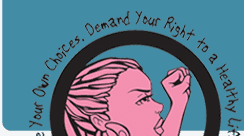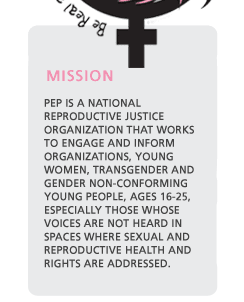| |
Home » Get the Facts » Reproductive Justice Issues
| What is Reproductive Justice?
Reproductive Justice is the complete physical, mental, spiritual, political, social, and economic well-being of women and girls, based on the full achievement and protection of women's human rights.
|
 | Reproductive Justice in Our Communities
Different communities face different barriers to accessing reproductive health care and attaining reproductive justice. Women of color, women with disabilities, young women, women who are incarcerated, women involved in sex work, low-income women, and LGBTQ people are all involved in the reproductive justice movement.
|
 | Parenting and Giving Birth
The ability to decide when and how to have children is an important part of reproductive justice. Historically, some women have been prevented from being parents, while others have been prevented from not being parents. There are also government regulations of how women are allowed to give birth.
|
 | Abortion and Birth Control
In the United States, women have the right to prevent a pregnancy, or to terminate an unwanted pregnancy. But for many women, there are obstacles to exercising those rights. Some of those barriers are political, some are social, some are economic. In this section you'll find articles, perspectives, and information about abortion and birth control.
|
 | Sex Education
Sex education helps people make safe and healthy choices about being sexually active by providing resources such as how to obtain birth control, how to use a condom, and how to communicate with sexual partners.
|
 | Access to Reproductive Health Care
Anti-choice politicians and activists have passed laws and created policies that restrict women's ability to access reproductive health care, including restrictions on funding sources, parental involvement laws, restrictions on health care providers, religious refusal clauses,and misleading abortion bans.
|
 | Reproductive Technologies
There are more and more ways to control fertility - from sterilization to in vitro fertilization, reproductive technology poses new issues for women and for the reproductive justice movement.
|
 | Spirituality and Reproductive Justice
People of faith have always been engaged in the movement for reproductive freedom, from the clergy referral network before abortion was legal to current advocacy work by spiritual leaders and religiously affiliated pro-choice organizations.
|
 | Sexual Health, Anatomy, and STD's
Questions about your sexual health? In this section you'll find answers to all your questions about getting healthy and staying healthy, as well as important information about anatomy, STD's, HIV/AIDS, and other sexual health issues.
|
Share on Facebook
|
|
|






